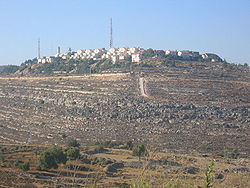| Revision as of 22:17, 11 September 2010 view sourceCptnono (talk | contribs)Autopatrolled, Extended confirmed users, Pending changes reviewers26,588 edits using the image parameter in the infobox better?← Previous edit | Revision as of 22:21, 11 September 2010 view source Ynhockey (talk | contribs)Autopatrolled, Administrators67,005 edits +factoidNext edit → | ||
| Line 23: | Line 23: | ||
| ==History== | ==History== | ||
| Psagot was established in 1981 by a ] of residents of the ] |
Psagot was established in 1981 by a ] of residents of the ] neighborhood of ]. Psagot is illegal under international law.<ref name="bbc" /><ref>Whitacker, Brian. The Guardian. 3 September 2001</ref> | ||
| ==Economy== | ==Economy== | ||
| Psagot winery was founded by Na’ama and Ya’akov Berg, who planted vineyards in 1998. In addition to a modern barrel cellar, some of the oak barriques are stored in a cave dating back to the ]. The winery’s top wine is a Bordeaux blend named Edom. Regular varietal wines are produced in the Psagot series and there is also a Port-style wine. In 2007 and 2008, the winery produced 65,000 bottles annually.<ref name="rogov" /> | Psagot winery was founded by Na’ama and Ya’akov Berg, who planted vineyards in 1998. In addition to a modern barrel cellar, some of the oak barriques are stored in a cave dating back to the ]. The winery’s top wine is a Bordeaux blend named Edom. Regular varietal wines are produced in the Psagot series and there is also a Port-style wine. In 2007 and 2008, the winery produced 65,000 bottles annually.<ref name="rogov" /> Other wineries exist around Psagot, and the ] hopes to make them a tourist attraction.<ref name="bbc" /> | ||
| ==References== | ==References== | ||
| {{reflist|refs= | {{reflist|refs= | ||
| <ref name="cbs-loc">{{cite web|title=Locality File|year=2008|url=http://www.cbs.gov.il/ishuvim/ishuv2008/bycode.xls|publisher=]|format=XLS|accessdate=2010-06-22}}</ref> | <ref name="cbs-loc">{{cite web|title=Locality File|year=2008|url=http://www.cbs.gov.il/ishuvim/ishuv2008/bycode.xls|publisher=]|format=XLS|accessdate=2010-06-22}}</ref> | ||
| <ref name="bbc"> BBC. 17 June 2009</ref> | |||
| <ref name="rogov"> at Rogov's Reviews</ref> | <ref name="rogov"> at Rogov's Reviews</ref> | ||
| <ref name="hareuveni">{{cite book|title=Lexicon of the Land of Israel|year=1999|author=HaReuveni, Immanuel|publisher=MIskal – Yedioth Ahronoth Books|page=795|isbn=965-448-413-7}}</ref> | <ref name="hareuveni">{{cite book|title=Lexicon of the Land of Israel|year=1999|author=HaReuveni, Immanuel|publisher=MIskal – Yedioth Ahronoth Books|page=795|isbn=965-448-413-7}}</ref> | ||
Revision as of 22:21, 11 September 2010
Place in Israel| Psagot | |
|---|---|
 | |
| Country | Israel |
| Council | Mateh Binyamin |
| Region | West Bank |
| Affiliation | Amana |
| Founded | 1981 |
| Founded by | Beit VeGan residents |
| Population | 1,623 |
Psagot (Template:Lang-he-n, lit. Peaks) is a communal Israeli settlement in the West Bank. Located near Ramallah, it falls under the jurisdiction of Mateh Binyamin Regional Council. The offices of the regional council are located in Psagot. In 2008 it had a population of 1,623.
Geography
Psagot is located on the peak of Mount Tawil, hence its name. It can be accessed from Highway 60 from the north and south.
History
Psagot was established in 1981 by a gar'in of residents of the Jerusalem neighborhood of Beit VeGan. Psagot is illegal under international law.
Economy
Psagot winery was founded by Na’ama and Ya’akov Berg, who planted vineyards in 1998. In addition to a modern barrel cellar, some of the oak barriques are stored in a cave dating back to the Second Temple. The winery’s top wine is a Bordeaux blend named Edom. Regular varietal wines are produced in the Psagot series and there is also a Port-style wine. In 2007 and 2008, the winery produced 65,000 bottles annually. Other wineries exist around Psagot, and the Yesha Council hopes to make them a tourist attraction.
References
- ^ HaReuveni, Immanuel (1999). Lexicon of the Land of Israel. MIskal – Yedioth Ahronoth Books. p. 795. ISBN 965-448-413-7.
- "Locality File" (XLS). Israel Central Bureau of Statistics. 2008. Retrieved 2010-06-22.
- ^ Settler vineyards take root in West Bank BBC. 17 June 2009
- Whitacker, Brian. The summit of Middle East tension The Guardian. 3 September 2001
- Psagot Winery at Rogov's Reviews